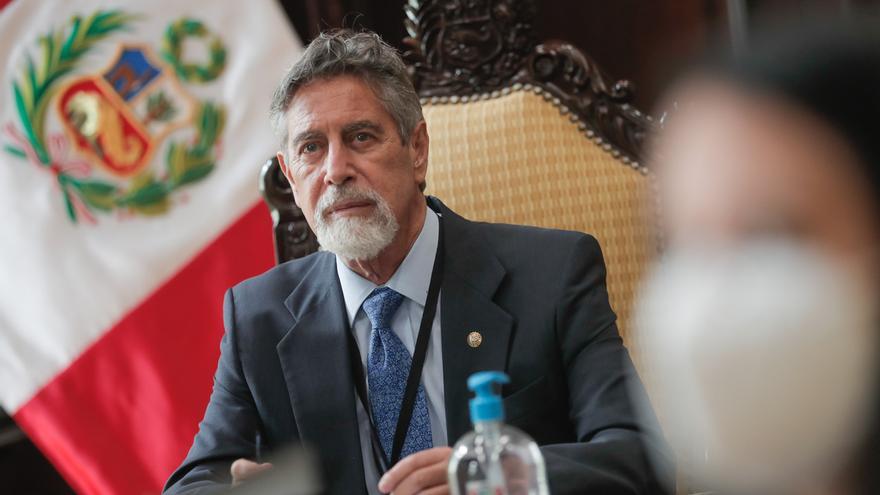The short presidency of Peru by academic Francisco Sagasti set a precedent in global political administration, pointing out that it is possible to run a country with scientific accuracy, transparency, and respect for all political options. But the will of the citizen is required for the example to spread in the humanitarian political night in which we were inaugurated.
Related
Francisco SagastiThe president of his country for eight months and ten days, between 2020 and 2021, was fully aware of what he was saying when he said: “Peru is a country with a great responsibility and a great mission.”
He reached the presidency in a completely unexpected way. At a lunch we shared in 2019 in Madrid, he told us: “At the age of 75, I decided to devote myself to politics.”
None of us diners could have imagined that the following year he would occupy what is also called the Casa de Pizarro or the Government Palace of Peru, as it was said, “elected by his enemies”: he was the only compatible figure able to solve a problem. The institutional power vacuum (with seven presidents in six years) resulting from an unprecedented social, health and economic crisis, while at the same time restoring confidence and hope to citizens.
Governance in times of crisis
And now we meet again last Thursday at the headquarters of the Empresa Institute to present his book “Governing in Times of Crisis” (Planeta, Lima 2023), which, far from being a personal account of an extraordinary experience, is the result of research work. It was carried out under the protection of the Institute of Peruvian Studies and the Canadian Center for International Development Research.
These details represent what we consider to be the most important part of his presidential experience: A remarkable scientific style in his political managementWhich is not so surprising considering that when he was elected President of the Republic, he had already directed the Board of Directors of the Science and Technology Program of the Peruvian Council of Ministers.
With these introductions, after his leap into politics, Francisco Sagasti began to be part of a new generation of public figures who propose to manage society on foundations built on ethics and scientific knowledge applied to improve people’s living conditions.
As far as we know, there are not many people who are part of this new generation of politicians, but Francisco Sagasti is a pioneer because he was able to head a transitional and emergency government with this mentality, a clear indication of the dawning of the revolution. A new time to rule the world…
Governance vectors
Although it was more than a symbolic presidency due to its short duration, the Sagasti presidential administration was one of its tools in making decisions based on reliable data and information, which in technological terms is called Evidence-based certainties also Reasonable conclusions.
This premise required his government team to exhaustively search for truthful information about the problems to be solved, especially the management of the Covid-19 pandemic that characterized his short tenure, carefully selecting reliable sources and surrounding himself with a team of senior officials. Expert-level, experienced in managing scientific knowledge in various fields of knowledge, regardless of partisan criteria or influences derived from dark interests.
A future and global vision
He also did not lack in managing his presidency Theater formatthe prospective exploration of a possible future, with the aim of making an accurate estimate of what might happen on the one hand, and on the other hand preparing different responses to the situations that will eventually arise.
The wealth of international relations accumulated throughout his academic career (industrial engineer and PhD in social systems sciences, as well as professor at the University of the Pacific, the Wharton Business School and the Madrid Business Institute) has also helped him support a team with a management style that is far removed from the prevailing norms of contemporary politics, where lies and interests dominate. Own favoritism and conspiracy theories often influence the rhetoric and actions of public leaders.
Transparency and closeness
All this has been translated into an administration based on transparency, closeness to citizens, dialogue with all political forces (in a country where parties act as “surrogate wombs for politicians with personal ambitions,” as described in the book) and in an innovative principle in these principles. Hard times: Respect any political positionwithout falling into exclusions or provocations based on insults (which were also present).
His short presidency did not solve the country’s problems (which was quite far-fetched), but he averted a governance crisis that seemed inevitable, just as he contributed to confronting the epidemic by mobilizing all sectors of society, recovering and stabilizing normal institutional life, thanks to respect for the constitutional hierarchy. Political neutrality in elections for public office.
Knowledge and experience
Sagasti, as he explains in his work, was aware that there was no other way to restore the hope and confidence of citizens than to mobilize the knowledge and experience of a team willing to do politics in another way, while achieving tangible results: achieving a climate of relative friendliness in which friction did not prevent fluid and temporary alliances to support Legislative initiatives.
The first conclusion he reached during his short presidency was that it is possible to govern any country honestly, transparently and rigorously if we keep the global context in mind.
This context, from a scientific perspective, is called Sagasti The end of the Baconian erawhich, although it managed to successfully apply scientific and technological knowledge to production systems, at the same time caused a series of visible negative side effects, both at the environmental level and in various fields of science, technology and production, such as He left a record In his previous book Science, technology and innovation. Latin American policies (Mexico, Economic Culture Fund, 2011).
In 2016, Francisco Sagasti already presented, in this interview with T21TV, the main lines of his thinking and analysis of the global environment in which his presidency of Peru developed after seven years. Francisco Sagasti has been a member of the Tendencias21 editorial board since 1988.
Scientific culture
The second conclusion of his presidency is that any country can be governed in a new way if it takes into account scientific culture, the greatest treasure achieved by our civilization, which is largely unknown, if not hated, by society (and especially by some politicians). , and at the same time it is lost because it is limited to the often unconscious use of its technological derivatives.
After the ruling of Sagasti and his team, the truth is that Peru has become the first country in the modern era to demonstrate the effectiveness of carrying out public administration with scientific standards adapted to the realities of the moment, and with a new way of working. Politics that restores the principles of the Enlightenment.
Great job
In this way, Peru achieved Great job This is what Sagasti thought because the experience of his short presidential term could inspire other countries and regions to think and conduct politics on other, more lofty grounds and overcome the limitations that led us to the greatest political decline in the history of our species. .
His presidency is a Ray of light In the humanitarian political night that confirms that another world is possible… if we really decide to build it.
This will is necessary because, after the transitional government and the emergency, Peru has returned to the “abnormal state” that prevailed before the crisis: it is still mired in acrimonious political disputes that have made it ungovernable, and Sagasti has gone into opposition demanding, like the Prime Minister. The Prophet who cries in the desert, resorting to knowledge, transparency and affection to confront common problems.
But nothing indicates that this is the end of the story. What did you say Jaime Palmes In 1846, “History is the science which deals with the past to illuminate the present and guide the future.”





